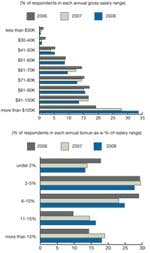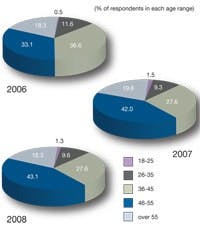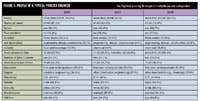A Mixed Bag
By Katherine Bonfante, digital managing editor, and Jim Montague, executive editor
Some good news now. Some bad news soon. Thats the word from the more than 700 respondents to Controls 2008 Salary Survey, who collectively reported increasing pay for their richest members, flat or declining compensation at most other pay levels and continuing erosion in standard benefits.
Figure 1: Richest get Richer
The respondents to 2008s emailed and online salary survey again reported a big jump among those in the highest salary category compared to the year before (Figure 1). Basically, respondents earning salaries above $100,000 increased to 33.7% in 2008 from 27.9% in 2007, while those in almost every pay range below this decreased slightly. Meanwhile, those receiving bonuses of 6% to 10% or 11% to 15% of their salaries increased about two percentage points each. In addition, while those taking three weeks of vacation increased to 31.8% in 2008 from 27.3% in 2007, those with four weeks of vacation decreased to 26.4% in 2008 from 30.6% in 2007, and those taking more than a month off per year dropped to 26.8% in 2008 from 28% in 2007.
Figure 2: Aging Gracefully
Likewise, slightly fewer of 2008s respondents reported receiving standard benefits than the year before. These small declines occurred in medical, dental and life insurance coverage, 401k, disability, tuition reimbursement, pension plans, profit sharing and company cars. A slight increase was reported by telecommuters.
Consistent Demographics, Few Shifts
The most populous group of respondents remains those from 46 to 55 years old. Last year, they composed 42% of our participants, but in 2008 they made up 43.1%, while their older and younger colleagues decreased slightly. However, respondents 18 to 25 decreased a bit to 1.3% in 2008 from 1.5% in 2007, while those over 55 years decreased to 18.3% in 2008 from 19.6% in 2007, most likely due to retirements (Figure 2).
Figure 4: More Experiences Supervisors
In addition, respondents with 11 to 20 years in process control dipped slightly to 30.5% in 2008 from 31.7% in 2007 and 34.8% in 2006. However, those with 11 to 20 years of supervisory experience in process control increased to 25.9% in 2008 from 22.9% in 2007, while those with more than 30 years of supervisory experience swelled to 12.9% in 2008 from 10.9% in 2007. (Figure 4).
Unfortunately, one group that decreased slightly was women engineers. Last year, 6.4% of our respondents were female, but only 5.5% of 2008s respondents were women. This confirms the trend that women and younger professionals still arent joining the engineering workforce in large numbers or at as fast a pace as in other professions.
When it comes to race, White/Caucasian is still the dominant ethnic group with 86.5% of 2008s participants. Meanwhile, minority groups, such as Blacks, Asians and Hispanics tallied only 2.3%, 5.0% and 3.9%, respectively. However, though most process control engineers and related technical professionals remain overwhelmingly white, male, U.S. residents, who are married with children (Figure 3), there are a few other demographic shifts worth noting. For instance, respondents identifying themselves as married declined again to 84% in 2008 from 85.5% in 2007 and 90.5% in 2006, while those with kids dropped to 84.8% in 2008 from 86.3% in 2007.
Book Smarts, Street Smarts
Though respondents with four-year undergraduate degrees dipped slightly to 51.9% in 2008 from 54.1% in 2007, the most prevalent academic degree remained other, mostly mechanical engineering and chemistry at 37.6% in 2008 compared to 37.1% in 2007. The next most popular areas of study were electrical engineering at 28.6% and chemical engineering at 20.3% in 2008.
Figure 6: Less OT, Hiring; More Promotions
Long hours seem to be the rule in process control engineering. For example, more than 78% of 2008s participants work 41-60 hours per week and 77.2% arent paid overtime.
Likewise, those in the engineering, design and construction job category decreased slightly to 41.9% in 2008 from 45% in 2007, while those in production and plant operations again increased to 27.6% in 2008 from 22% in 2007. Also, the largest single group (19.8%) works in the chemical industry, while food and beverage and oil and gas each attracted a little over 10% of participants.
Job Security and Economics
Just as everywhere else, national and global economic problems cast a long shadow over many process control respondents, and affecting their work dynamics and company behaviors. Nearly 43% of those surveyed say their employers hiring processes have been affected by the economy, while 19.4% say their raises and promotions have been affected. However, despite these stresses, more of our respondents also seem to be optimistic. In 2007, 56.6% of those surveyed said they were unconcerned about job security. In 2008, 58.1% reported feeling the same way.
Several observers report that skyrocketing oil prices and related inflation, new and revived international and domestic process application projects, and an aging workforce are all contributing to increasing demand, competition and compensation for control engineers. Steadily increasing use of process control technologies in pharmaceutical, food and beverage, and hybrid applications also is fueling the need for engineers. Still, the most widely acknowledged factor is the accelerating retirement of older engineers, who arent being replaced fast enough because too few students pursue process control and engineering careers.
Because of this scarcity and lower labor costs, it might be assumed that outsourcing would be on the increase. However, while more players report using outsourcing, each adds that theyre using it less. For example, just over 69% of 2008s respondents report outsourcing professional/engineering services, while more than 67% reported outsourcing in 2007 (Figure 5).
Figure 5: Slightly more outsourcing
Despite this much-professed need for engineers, hiring and overtime decreased slightly and layoffs increased over the past year. Respondents reporting that their firms are hiring slipped to 47.2% in 2008 from 48.8% in 2007, while those offering overtime dropped to 27.1% in 2008 from 30.5% in 2007. Meanwhile, layoffs jumped to 18.5% in 2008 from 16.6% in 2007.
However, one especially positive note is that companies offering promotions and raises continued to increase to 19.4% in 2008 from 15.2% in 2007 from 11.8% in 2006.
Talking Points
More than 160 respondents to the 2008 Salary Survey offered perceptive comments besides their multiple-choice answers, which may give their fellow engineers and managers some useful insight into issues and, perhaps, the relative health of their various organizations. Some of the most interesting included:
- With the economy the way it is, we have to worry about whether well have jobs for ourselves and our children in the future. pharmaceutical plant manager from Missouri
- It continues to amaze me that corporate leadership can see the need to reduce cost and increase efficiency, but dont pursue automation and controls to do so, even when virtually every facet of their very lives is engulfed in electronics/technology. electrical engineer at pulp and paper plant in Michigan
- The corporation I work for has no provisions for advancement and no career path established. The way the economy is currently, Im worried about getting cut because improvements realized with respect to reliability can only be realized over time, not over night. reliability/maintenance engineer for 10 plants in Texas
- In our movement to open systems or Industrial Networking Systems, it appears that our gap in the skill sets of a traditional process control engineer is becoming more apparent. The systems aspects of the job, such as keeping up with software revisions, both operating platforms and applications, are becoming full-time jobs. These activities are taking the control engineer away from process and control loop optimization. Our group really needs one more person with an IT skill set to meet the needs of our ever evolving systems. chemical plant engineer in Louisiana
- The new generation of engineers lack basic skills and are no where near as creative as 30 years ago. Their math, English and problem-solving skills are horrible. Theres too much teamwork through the educational process, where individuals can depend on the good student to carry 90% of the load, while the rest of the team skates. The managers challenge of today is to find those truly intelligent students and not the parasites. research director at food and beverage company in Illinois
- The need to shift to a budgeted contracting solution for engineering services isnt fully understood by management yet, even though all of our corporate engineering staff is gone, and our local engineering production support staff is less than half what it was three or four years ago. production and maintenance engineer at chemical plant in New York
- There arent enough engineers to fill the open positions. It doesnt matter if its a controls engineer, civil engineer or other discipline. The industry is fighting for every engineering asset and is starting to rob one other to fill their needs. Were on the brink of a bidding war. Some companies are already taking preemptive steps to show appreciation for their engineers and give them unscheduled salary adjustments, and management is meeting with the engineering staff to communicate their desire to keep their staff intact. engineer at power utility in Nebraska
- Theres very little appreciation in upper management of the value of experienced people in manufacturing. Expectations are for cookie-cutter solutions to try to solve what are unique problems and issues with an older plant. production and maintenance engineer at chemical plant in West Virginia
- Benefits decreasing every year. More and more workload and stress. Management has few clues and only care about their own butts. Lots of work out there in electrical power business. Inflation is killing our buying power due to meager salaries and raises. Time for revolution! Ha. engineer at energy utility in South Carolina
- At a time when our positions and responsibilities become more technical, the education and work ethic seems to be falling. I expect those who are capable will become much more scarce as the boomers retire. Im missing some of them already. plant maintenance and IT technician at plastics plant in Wisconsin
- The process control field is very short on good, talented, competent people that know what theyre doing, which makes me a valuable commodity with my employer. plant and operations engineers at chemical plant in Louisiana
- Huge increase in company profits. Huge decrease in company benefits. Pension plan deleted and retirement benefits cut drastically even though pension plan was healthy. Huge increases in employee costs for health-care premiums. Continuing decreases in health-care coverage. process control supervisor at chemical facility in Wyoming
- Layoffs occurred here last year, and there may be more coming. Morale is low. The company says its concerned about retention but its actions dont reflect that concern. principal automaton engineer at pharmaceutical firm in Washington
- My company has difficulty recruiting and retaining engineers, especially I&C engineers. The new-graduate retention rate is extremely low. The company is trying to deal with an aging workforce issue. Engineering is not being promoted in the U.S. at near what is needed. This is proven by all of the foreign engineers that are now being hired by U.S. companies. senior I&C engineer at electrical utility in Illinois
- Low bidder rules. Engineering input is discounted if it costs a little more. Suppliers are non-responsive, provide shoddy equipment and once the sale is made, could not care less. It makes no difference if its a U.S. company or a foreign one. None seem to care about long term relationships with their customers anymore. senior electrical engineer at energy utility in Indiana
- Whenever I hear a suit say, Our employees are our greatest asset, what I hear is, These damn employees are obviously our greatest liability (drain on profits), and lets see if we can do it cheaper in China, India or Pakistan. quality control engineer at pharmaceutical plant in Maryland.







